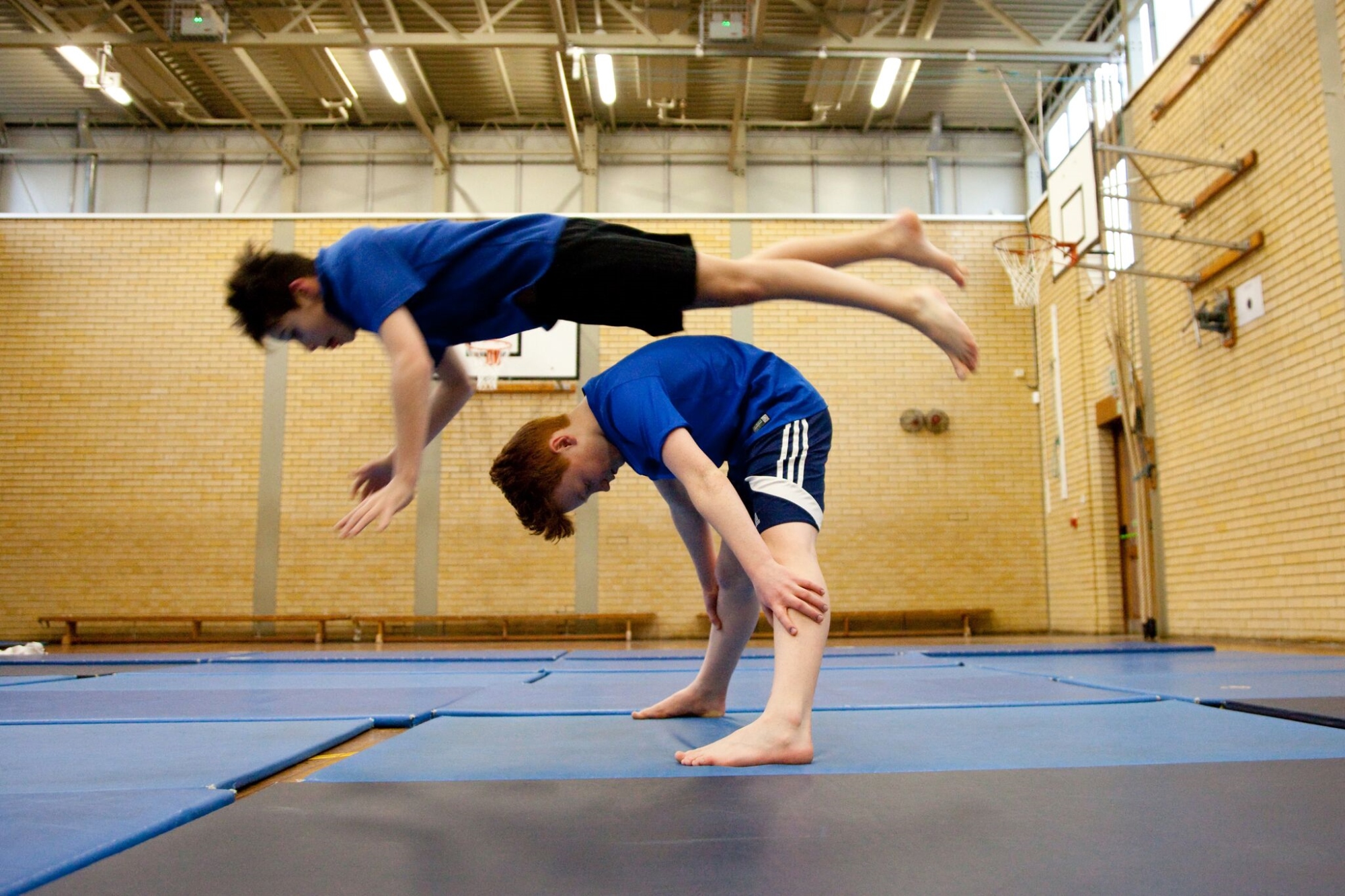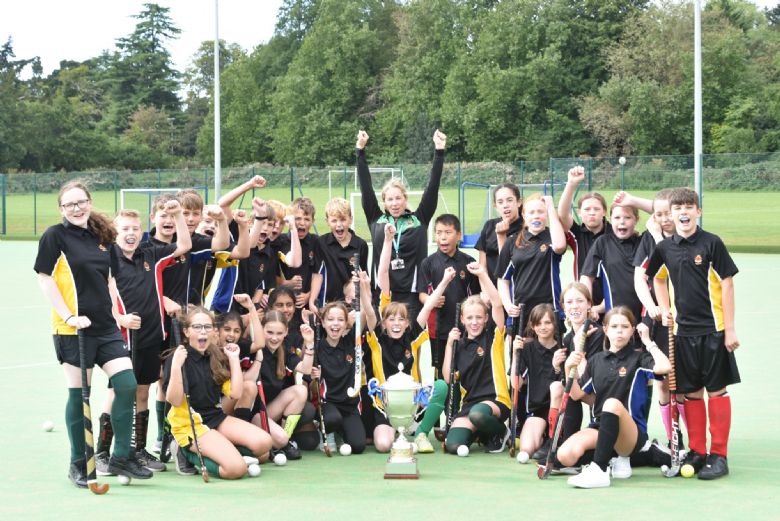Welcome to the PE Department
-
Christopher Michael - Director of Sport
-
Nicola Jones - PE Teacher
-
Richard Mann - PE Teacher & Head of Upper School
-
Mr Patrick Garlick - PE Teacher
-
Lauren Collins - PE Teacher
-
Stephen Barry - Assistant Coach
What is GCSE PE, and why is it important?
GCSE PE students will be required to show practical skills, research and investigational skills as well as applying theory to real life contexts. It develops an understanding of the importance of being physically active for physical health, mental wellbeing and development of social skills. Both the practical and theoretical elements of the course require students to use their problem-solving and communication skills as well as showing sportsmanship, leadership and the need to work as team players.
What do students learn in GCSE PE?
Practically, students will be taught skills and tactics needed to play / perform in a variety of sports included in the table below (there may be changes in this dependent on the experience of the cohort of students). In theory, they have a paper based on fitness and body systems and another paper on health and performance. In addition to this, they plan, carry out and evaluate a personal exercise programme focussing on a sport of their choice.
Challenge and support in PE
Challenge in practical is applied by adding more difficult contexts to practical tasks. This may be done by time pressure, pressure of a defence, using weaker sides, hands or feet, leading others in their learning of skills and team leadership to apply tactics.
Students are supported by using different equipment or larger space, ensuring mastery of basic skills in isolated practices, ensuring balanced competitive experiences and 1 to 1 feedback.
In theory, we spend time on topics to ensure the foundation of knowledge is mastered, which enables students to understand the more complex tasks.
How is GCSE PE assessed?
The course is made up of 60% theory, 30% practical and 10% coursework.
Students will sit 2 exams in year 11, one worth 36% the other 24%. They will be assessed in 3 sports, one individual, one team based and another team or individual sport.
For the 10% coursework, students will plan a training program based on a component of fitness that is relevant to a sport of their choice. They carry out the training programme and evaluate it over a 6-week period.
Learning beyond the classroom
Many of our GCSE PE students participate in weekly clubs inside and outside of school; and often represent the school at various fixtures. A full list of our clubs can be found here.
There is regular home learning for GCSE PE, which is largely theory based.
In addition to weekly clubs there is the opportunity to attend trips to watch professional / semi-professional sport events; however, these vary from year to year depending on availability of tickets for various events. Students also have the opportunity to participate in special events, competitions and activity days.
Where can PE lead?
The aim of GSCE PE is to provide a variety of experiences to encourage and enable students continue to enjoy being physically active when they leave school. Students may also go onto do sport courses or degrees at college and university, leading into multiple career opportunities/jobs such as physiotheraphy, exercise physiologist, fitness centre manager, personal trainer, sports admin, sports coach, sports development officer. For those that play sports to high level, they strive to perform to the highest level possible.
BTEC PE Curriculum Overview
What is BTEC PE and why is it important?
BTEC PE students will be required to show practical skills as well as applying theory to real life scenarios. It develops an understanding of the importance of being physically active for physical health, mental wellbeing and development of social skills. Both the practical and theoretical elements of the course require students to use their problem-solving and communication skills as well as showing sportsmanship, leadership and the need to work as team players.
What do students learn in BTEC PE?
Practically, students will be taught skills and tactics needed to play / perform in a variety of individual and team sports. They are required to analyse and coach other students to improve their practical performance. In theory they have a paper based on fitness and body systems and another paper on health and performance. In addition to this they plan, carry out and evaluate a personal exercise programme focussing on a sport of their choice.
Summary of curriculum content
|
Y9 |
Y10 |
Y11 |
Component 1Preparing Participants to Take Part in Sport and Physical Activity.Research into sport as an industry. |
Component 2Taking Part and Improving Other Participants Sporting Performance.How we learn skills and practice to improve in sport |
Component 3Developing Fitness to Improve Other Participants Performance in Sport and Physical ActivityHow the human body allows us to be active and how to train to improve this |
Challenge and support in PE
Challenge in practical is applied by adding more difficult contexts to practical tasks. This may be done by time pressure, pressure of a defence, using weaker sides, hands or feet, leading others in their learning of skills and team leadership to apply tactics.
Students are supported by using different equipment or larger space, ensuring mastery of basic skills in isolated practices, ensuring balanced competitive experiences and 1 to 1 feedback.
In theory lessons we spend time on topics to ensure the foundation knowledge is mastered that enables students to understand the more complex tasks.
How is BTEC PE assessed?
The course is made up of 3 components; components 1 and 3 are worth 30% each and component 3 is worth 40%. Students will be given a context to apply their theory learnt in each component. These are released in January of Year 10, June of year 10 and January of year 11. Some of the assignments involve written work, filmed power point presentations, filmed evidence of playing sport and drills or filmed evidence of coaching others in the class.
Learning beyond the classroom
Many of our BTEC PE students participate in weekly clubs inside and outside of school; and often represent the school at various fixtures. A full list of our clubs can be found here.
There is regular home learning for GCSE PE, which is largely theory based.
In addition to weekly clubs there is the opportunity to attend trips to watch professional /semi-professional sport events; however, these vary from year to year depending on availability of tickets for various events. Students also have the opportunity to participate in special events, competitions and activity days.
Where can BTEC PE lead?
The aim of BTEC PE is to provide a variety of experiences to encourage and enable students to continue to enjoy being physically active when they leave school. Students may also go onto do sports courses or degrees at college and university, leading to multiple career opportunities/jobs such as physiotherapy, exercise physiologist, fitness centre manager, personal trainer, sports admin, sports coach, sports development officer. For those that play sports to high level, they strive to perform to the highest level possible.
Core PE Curriculum Overview
What is PE, and why is it important?
It is important, to be confident, to maintain involvement in sport and physical activity throughout their lives. We promote the importance of PE to students' physical health, mental wellbeing and development of social skills. In order to achieve these aims, we focus on teaching key themes across a wide variety of traditional and non-traditional activities in which we challenge students to be problem solvers, confident, good communicators and to show sportsmanship in leadership and as team players.
What do students learn in PE?
Skills and tactics needed to play/perform in a variety of activities and knowledge of rules and techniques in order to officiate and analyse performance across invasion games, net/ wall games, striking and fielding games, aesthetic activities and fitness.
Summary of curriculum content
Y7 |
Y8 |
Y9 |
Y10 |
Y11 |
Primarily skills taught in order to performA 5 week block of 5 of the activities below in the Autumn / Spring term:Rugby, Netball, Basketball, Football Badminton, Hockey, Gymnastics, Fitness, DanceA 5 week block of all 3 activities in the summer term:Athletics, Tennis, Striking and Fielding (Cricket and Rounders) |
Students are given a greater choice of which activities they wish to study with a focus on developing tactics and performance skills using the skills learnt in KS3.A half term block of 6 of the below activities:Rugby, Netball, Basketball, Football, Badminton, Hockey, Gymnastics, Dance, Fitness, Athletics, Tennis, Cricket, Rounders, Handball, Trampolining, Roundnet |
|||
Challenge and support in PE
Challenge is applied by adding more difficult contexts to practical tasks. This may be done by time pressure, pressure of a defence, using weaker sides, hands or feet, leading others in their learning of skills and team leadership to apply tactics.
Students are supported by using different equipment or larger space, ensuring mastery of basic skills in isolated practices, ensuring balanced competitive experiences and 1 to 1 feedback.
How is PE assessed?
Core PE is not an examined subject, but assessment is undertaken every term based on the following criteria. KS3: How have they demonstrated the key skill that is the focus for that term (in termly order of confidence, sportsmanship, communication, problem-solving, knowledge of health and fitness and leadership).
Effort grades will be based on organisation of kit, engagement with activities and peer group. In KS4, they are assessed purely on their effort within core PE.
Learning beyond the classroom
PE offer a wide range of weekly clubs that run on a seasonal basis. A full list of our clubs can be found here.
There is no regular home learning for core PE.
In addition to weekly clubs there is the opportunity to attend trips to watch professional/semi professional sport. These vary from year to year depending on availability of tickets for various events.
Where can PE lead?
The aim of core PE is to provide a variety of experiences to encourage and enable students continue to enjoy being physically active when they leave school. The knowledge and skills they learn should also allow them to thrive on a GCSE PE, BTEC PE or BTEC Performing Arts Dance course.



